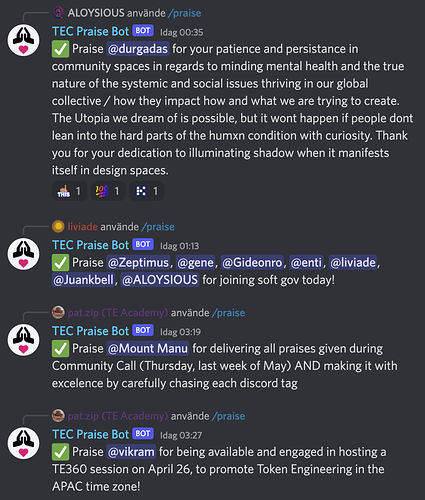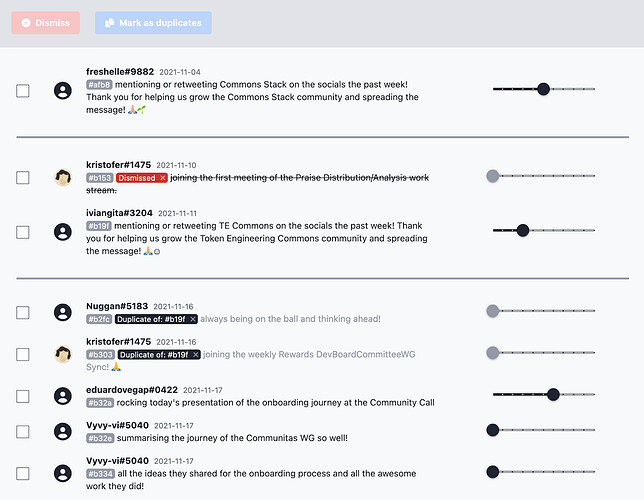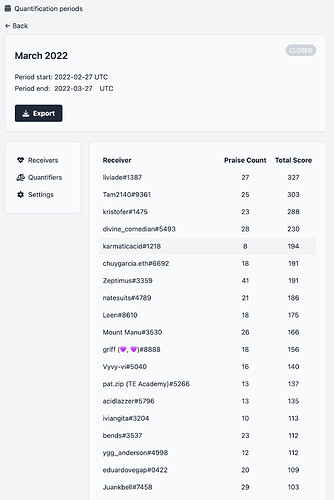The upgraded version of Praise is ready to be spread out into the vibrant galaxy of DAOs. The Commons Stack has developed the tools necessary to perform this praise upgrade and is offering it’s services to perform this upgrade for Giveth. Giveth is no stranger to praise, however this new version of praise system is an amazing new way to quantify subjective contribution and subsequently give rewards to contributors who are creating value for your organization. Giveth will benefit from the capabilities of the new Praise - including a more robust Discord bot, a new quantification front end, reporting via a new analysis engine and easier distribution. ![]()
![]()
![]()
![]()
Let’s take a closer look at how this system works:
Praise Process
The purpose of the praise process is to provide a way to record, reward and analyze work done by contributors of Decentralized Autonomous Organizations. With Praise, we can continuously collect acknowledged contributions, and track DAO activity in a decentralized manner. This Praise upgrade is a great way to reward regular and irregular contributors and engage your community in new ways!
Let’s take a deep dive into how each step of the process works:
Step 1 - Collect Data 
The most important step is to collect the data related to the work done by the DAO’s Contributors. Praise data is collected continuously and saved in a praise database. It is then submitted for Quantification on a regular cycle, this cycle can be defined in days, weeks or months, however you choose.
A Praise upgrade also comes with a shiny new Praise Bot which will help your community dish praise in a more structured manner.
Step 2 - Quantification 
We collect our praise data and put it down the quantification path.
The amassed praise will have to be quantified each cycle manually. Manual Quantification will be done by members of the community. Giveth will create a pool of Quantifiers from their community that have opted in for the responsibility of quantifying praise. Each cycle the Praise System will draft a group of randomly selected Quantifiers from this pool to complete this quantification task. The length of the Quantification Periods can be defined by Giveth but we recommend a bi-weekly period. Quantifiers will also be rewarded for the work they do in quantification to incentivize participation in the system.
-
Quantifiers will have a set period of days that Giveth can establish where a period is open to be quantified
-
Praise will be grouped by Praise Receiver inside the UI for quantifiers. This is important to see any duplicate praise, or praise from multiple sources for the same contribution.
-
Each instance of Praise can and should be quantified by multiple quantifiers, the reward system takes the average of all quantifiers’ scores for a single instance of praise to give it a final score. Giveth can set how many quantifiers should quantify a single instance of Praise.
-
Quantifiers will use a sliding scale of values to give a score to each praise. Giveth can decide what is the range of values a quantifier can give to an instance of praise. A few examples could be:
-
Linear:
- 1 → 2-> 3 → 4 → 5 → 6 → 7 → 8 → 9 → 10
-
Fibonacci sequence:
- 0 → 1 → 1 → 2 → 3 → 5 → 8 → 13 → 21 → 34 → 55 → 89 → 144
-
Squared:
- 0 → 1 → 4 → 9 → 16 → 25 → 36 → 49 → 64 → 81 → 100
-
Libertarian:
- 0 → 1000
-
Quantifiers can also mark an instance of praise as a duplicate of another praise or dismiss praise that is invalid, the qualifying metrics for these can be decided by Giveth.
- Quantifiers will have reference documents similar to the Rules of Praise and Quantifier Onboarding posts which will help them navigate the quantification process and learn how to dish great praise that makes quantifying easier and more accurate.
Step 3 - Analysis 
At the end of the quantification period a call can be held for the Quantifiers who wish to review the praise data to collaboratively analyze and suggest future considerations for other quantifiers and improvements to the praise system’s settings. To this end Giveth can leverage the Praise System’s Rewards Analytics and Distribution(RAD) tool to analyze and cross-reference data. These Review sessions will show us if there are any gaps in education around quantifying or dishing praise and also identify any problematic or errant quantifiers, bringing us cultural insights and help us find problems and strengths in the early stages. Check out this example to see how RAD helps communities analyze praise and rewards.
Step 4 - Calculate Rewards 
Once we have collected and analyzed the praise data we’ll use the associated quantification values to calculate the actual token amounts that will be distributed to each eligible recipient.
Step 5 - Final Approval 
The final token distribution will then be voted on by the Giveth DAO, the funding and distribution structure can be customized to meet Giveth’s needs, there are many ways of doing this. It is important to have a group of DAO members in the know to check on the final numbers and to make sure the distribution of funds makes sense, free from fraud or collusion and arrive punctually.
Also it is recommended to inform your community of the Rewards being sent out to your contributors. The RAD tool will produce the forum post and reports necessary for your community to understand who is getting what. Similar to what Giveth already does with GIVbacks, you can see a sample forum post here. Leaving this open for advice process or disputes before sending funds is recommended.
Step 6 - Distribution 
The Governance body approves the period’s distribution and sends out funds, usually via a multisend app like Disperse, Transactions App or CSV Airdrop. However Giveth can easily customize this part to meet the organization’s goals or preferences.
What this proposal provides
We’ve outlined what the Reward System is however let’s look at some concrete points of services and products that will be rendered by this proposal. Giveth can expect the praise to be upgraded in the following 5 steps. Project management is included in the proposal.
Step 1 - Prepare Stakeholders
- Kickoff session
- Introduce Praise to stakeholders
- Discussion and decisions:
- Roles & Reward Team
- Reward Team decisions
- Governance decisions
- Quantification configuration
- Analysis & reporting configuration
Step 2 Technical Deployment
- Deploy the backend server
- Deploy the Discord Bot
Step 3 Prepare Community
- Present Praise to the community
- Demo how to use praise and how to quantify
- Share analysis results
- Share Reward Board decisions
- Provide Praise documentations
Step 4 Praise Launch
- Train quantifiers
- Provide quantifier onboarding documentation
- Configure analysis
- Support in small batch quantifications for first couple of quants
- Support Praise Lead creating reports for the community
- Host community review sessions
Step 5 Follow-up / Cultural analysis
- Monthly follow-up session for cultural analysis and bug fixes over 3 months
- Capture what is the community sentiment about Praise
- Measure how active is the Praise system
- Is Praise achieving the intended purpose?
- Prioritization of issues
This work will be carried out by the Commons Stack Team, with assistance from General Magic. ![]()
Out of scope:
This list is meant to highlight some of the tasks that are out of scope but it is not a complete list.
- Sourcecred integration
- Telegram integration
Funding Requested 
We are asking for 17,500 USD worth of GIV for the services defined above.
Timeline 
We aim to have this upgrade live and operational within 2 months of this proposal passing.
You can review the Praise open-source repositories on GitHub:
- Praise Dashboard, Discord Bot - GitHub - commons-stack/praise: Praise community contributions to build a culture of giving and gratitude.
- Rewards Analytics and Distribution tool (RAD) - GitHub - CommonsBuild/rad: Rewards Analysis Dashboard by the TEC
Would you like to see this Praise Upgrade happen in Giveth?
- Yes! Love it!
- No, I have comments or concerns.
- Abstain
0 voters



